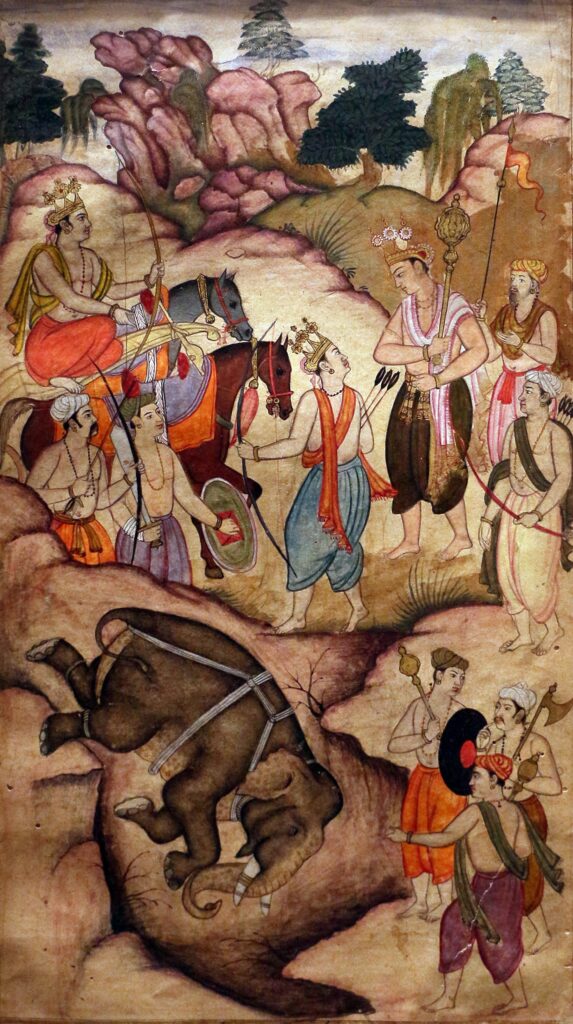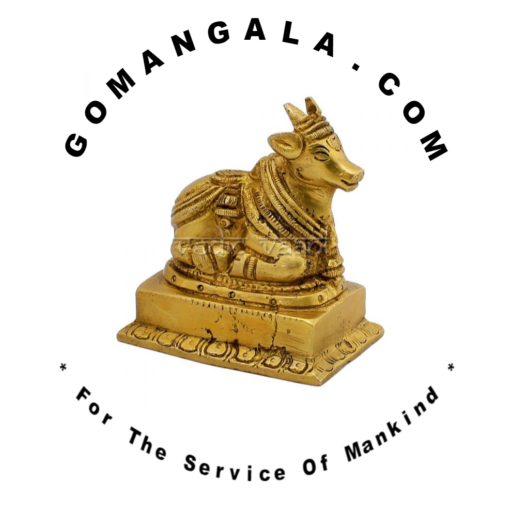Drona Vadha Parva is the seventy-first Upa parva in the seventh Maha parva named as Drona parva. Vaishampayana continued narration to Janamejaya in reply to his queries as follows.
What did Krishna tell regarding Drona to Bhima and Yudhishtira?
Krishna told regarding the war capabilities of Drona to Bhima and Yudhishtira. Drona was fighting continuously without rest day and night for four and a half days till the thirteenth midnight. Krishna said that, if the death message of Ashwathama was heard by Drona, then he would be withdrawing from the battlefield. At the same time, a team of great Rishis suddenly appeared before Drona and they opined Drona was doing wrong; he should not fight with his students.

How was Drona Vadha done by Drishtadyumna on the thirteenth night?
Soon after the moonrise, some of the soldiers were alerted by Yudhistira to continue the war in the early night of the thirteenth day. Karna found that Yudhishtira had been ready for fighting. Bhima was protecting Yudhishtira but they were tired of fighting. Leaving the fight with Satyaki, Karna started attacking Yudhishtira since Drona desired to capture him and make him a war prisoner.
Karna had defeated Yudhishtira who were on their elephants. Karna remembered his words of the promise given to Kunti, hence decided not to kill Yudhishtira and not report to Duryodhana. Karna had an ambition to win over Arjuna. At once, Yudhishtira got down from his elephant and Bhima killed the same elephant loudly saying अश्वत्थामा हतो हतो, which means Ashwathama had been killed. Then Yudhishtira also repeated the same as अश्वत्थामा हतो हतो but he continued, नरो न पुंजरः which means it was not man but an elephant. Krishna had blown his conch when Yudhishtira had continued his words. The plot was secretly planned by Krishna, Bhima and other soldiers.
Then, Drona was fighting with Drishtadyumna and he heard Yudhishtira saying, अश्वत्थामा हतो हतो but could not hear his next words due to the Panchajanya conch sound of Krishna. Most of the soldiers also had blown their conches being very tired, to stop the fighting for that night. Drona was confused to hear about Ashwathama since it was the name of his son. He was holding a bow and arrow fighting against Drishtadyumna in the middle of the battlefield but momentarily thought of his son before the body was hurt by the weapons of Drishtadyumna.
Thus, Drona was killed then and there. The conches being blown, the war was temporarily stopped, and the soldiers started hot discussions about the situation. Drona and an elephant both had died then, whereas Drona’s son was still living. Sanjaya had left the battlefield for the second time to report to Dritarashtra.
Why did Yudhishtira face Karna?
Karna would never kill Yudhishtira as per his promise to his mother Kunti. Moreover, Drona was very tired as well as in a sleepy mood. He could not be killed in the daytime but it was possible only under moonlight for Drishtadyumna. The elephant also had the name Ashwathama and the plot was planned by Krishna without the knowledge of Arjuna who was sleeping then. So Yudhishtira faced Karna and got defeated. Bhima had killed the elephant of Yudhishtira deliberately to misguide Drona and they had succeeded in their plans to win the war.
Why did Arjuna avoid Drona in the war and how did he face the war?
In the front, Kritavarma was facing the enemies. In the rear, Jayadratha was safely positioned. In the middle, Drona was directing the entire army. But Arjuna had avoided Drona in fighting. Arjuna announced, being his teacher, he avoided Drona. Being an enemy, Arjuna started attacking Jayadratha, which was also announced by him. This was already told in Jayadratha Vadha in the previous article on this website.
After splitting into three, how did the war continue on the battlefield?
Satyaki and Karna were fighting. Drishtadyumna and Drona were fighting. Yudhishtira and other Duryodhana’s soldiers were simply fighting for time to pass. When Satyaki and Arjuna slept in the night, Karna had defeated Yudhishtira. Before arresting Yudhishtira, Drona was killed by Drishtadyumna.
Why did Drona necessitate night war?
On the ninth day, Ghatotkacha had joined his father Bhima. The army intelligence of Drona and Ashwathama had reported this fact to Drona and Duryodhana. The demons were very cruel in nature and human beings could not fight with them. They became more powerful at night times and could attack at any time. As a precaution, Drona had discussed with Duryodhana and instructed many demons to counteract if Ghatotkacha had started assaulting human beings. Only Karna was able to fight with any kind of enemies. So night war was necessitated by Drona. Krishna understood this and ultimately Drona was killed by night war only.
Drona was killed at night on the thirteenth day of the war. What does this show?
Drona was killed on the night of the thirteenth day of war which shows Drona had been living as a commander in chief of the army including ‘demons’. So Krishna decided to kill Drona at night time as prescribed for the demons. But Krishna did not support demons so he was happy when Ghatotkacha was killed by Karna on the fourteenth day night. Drishtadyumna had condemned Drona for his features.
After Bhishma had fallen on the tenth day evening, who fell day-wise?
After Bhishma had fallen on the tenth day evening, Abhimanyu was killed on the eleventh day. Arjuna had killed the Samasaptakas on the twelfth day. On the thirteenth day, Jayadratha was killed in the daytime by Arjuna with the help of Krishna. Also on the thirteenth day, in the night war, Drona was killed in front of Karna by a team planning of Drishtadyumna, Bhima and Yudhishtira.
Later, on the fourteenth day, in the night war, Ghatotkacha was killed by Karna. On the fifteenth day, Karna was killed by Arjuna. Bhima had killed Dushasana on the sixteenth day. On the seventeenth day, Shalya was killed by Yudhishtira, and at night, Ashwathama had killed Drishtadyumna, Shikhandi and Upapandavas. On the eighteenth day, Bhima had fought with Duryodhana and killed him using his mace. Thus within eighteen days, the Mahabharata war was over at Kurukshetra.
Who lived forever from the time of Mahabharata?
Ashwathama, Vyasa Maharshi, and Kripa are three persons, still living forever. They are called as Chiranjivis and known from the time of Mahabharata.
How did Ashwathama come to know about the killing of Drona?
Kripa was the cousin brother of Drona. Ashwathama enquired with Duryodhana regarding the status of the war on the thirteenth day night. Duryodhana was feeling very sad and directed Kripa to explain the death of Drona to Ashwathama.
Who had donated the elephant to Yudhishtira and who killed it?
The elephant with the name Ashwathama was donated to Yudhishtira by Indravarma of the Malva kingdom. It was killed by Bhima to misguide Drona with a death message.
After Drona was killed, how did the war continue in Kurukshetra?
The war continued on the following day. Duryodhana, Shakuni, Uluka, the Madra king Shalya and Dushasana were alive with their soldiers and army then. Since his father was killed, Ashwathama was very angry with Pandava’s army. Duryodhana was fuelled by Ashwathama to continue the war with Karna as the commander-in-chief of his army. Karna had a very strong weapon called Vasavi Astra.
After Drona was killed, Drona himself entered the fire. It was called Prayopavesha. The wounds of his body were automatically set right by his yoga powers. Since the team of Rishis hinted at his death, he agreed to it. The soul had travelled up and only five people had seen the movements: Krishna, Arjuna, Yudhishtira, Vyasa and Sanjaya. Ashwathama also had some dangerous weapons kept secretly but he never disclosed them to anybody. Only Krishna knew them. Duryodhana ordered Ashwathama to use his Narayanastra on the same night.
Next post, Mahabharat: Narayanastra Parva would be more interesting.
Mahabharat: Karna Parva will be presented separately in another article.
What are the benefits of reading this story?
On reading this story, children would gain more memory power and great moral strength in their lives in future, creating a sense of self-reliance leading to peace and progress.
It is humbly prayed for the blessings of God Krishna upon us.
Readers may share this story with children, friends and family.

Leave a Reply